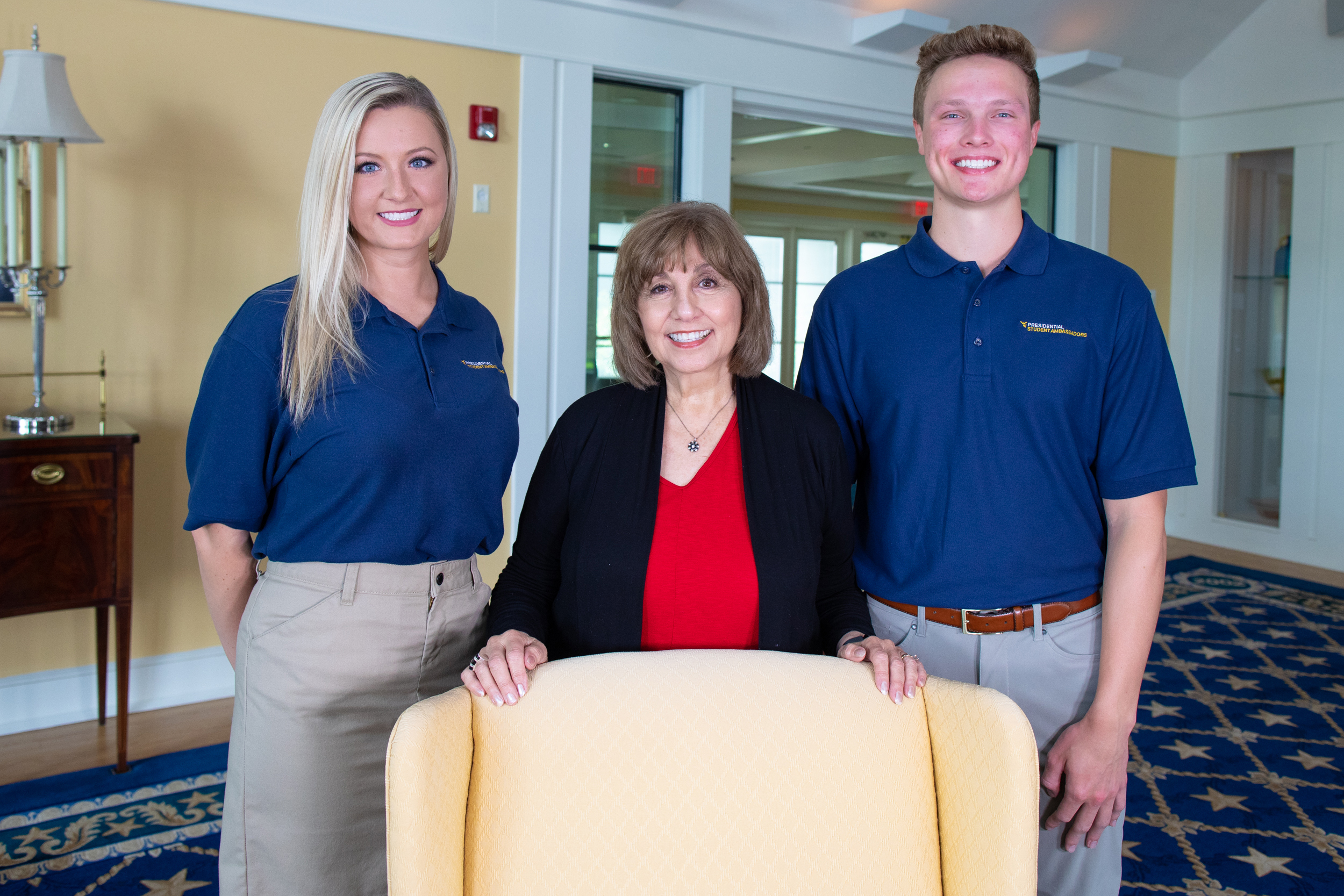WVU Today
Mountain State native Ashley Eby came to West Virginia University facing the same dilemma as many young college students: She had a strong desire to give back, but she was unsure what career path she should take.
As Eby navigated her freshman year in 2019, she was nominated to join the inaugural cohort of Presidential Student Ambassadors at WVU. The program helped Eby find her way — shifting her focus from law and public policy to medicine — through public speaking, leadership and service.
Now in its sixth cohort, the program has created a cadre of 60 student leaders who are united in their passion for WVU and willingness to share their Mountaineer pride with others.
“The role of Presidential Student Ambassador is pretty dynamic, from giving speeches at events to talking to incoming freshmen, going to high schools across the state and talking about the college experience and scholarships, or even just serving as an advocate and a mentor for my peers here at WVU,” Eby said. “There have been so many different diverse leadership experiences that we’ve had. We’ve gone through training, so we would be better leaders in a variety of different events and circumstances. So, there’s a lot that we do as PSAs, but mainly we speak to people, we serve as advocates for our peers and we serve the state.”
Program coordinator Carolyn Atkins is eager to identify new opportunities for students like Eby to expand their skills by participating in events, meetings, panel discussions and more — both on and off campus — to help advance WVU.
Atkins has been helping WVU students find their voices for four decades. The Presidential Student Ambassador program was inspired by her service on the Order of Augusta selection committee, where she observed that WVU’s most distinguished alumni had limited engagement with the university beyond graduation.
Her idea was twofold: To reconnect with past honorees to harness their knowledge, skills and experience to benefit WVU and to create a curriculum-based program that would cultivate future student leaders.
“I love WVU; I’m passionate about it,” Atkins said. “What better way to represent this university and to sell it than through our students, who are so engaging?”
The Presidential Student Ambassador program accepts 10 students each semester. Faculty are encouraged to nominate outstanding freshmen and sophomores, who must then apply to the program. Interested students also may apply with two letters of recommendation from faculty.
Participants must have a GPA of at least 3.7; be interested in leadership, service and public speaking; and make room in their schedules for two required courses in back-to-back semesters. While other universities offer student ambassador programs, Atkins said WVU’s is unique because of the course requirements.
The first class is an introductory course that teaches students about leadership and service opportunities at WVU. Students must complete 40 hours of service during the semester, and they learn from a variety of guest speakers, including many former Order of Augusta recipients with whom Atkins has reconnected. As part of what Atkins calls the Presidential Augusta Ambassadors Leadership Lecture Series, former recipients — such as former Mountaineer Trevor Kiess, Speaker of the West Virginia House of Delegates Roger Hanshaw and Labcorp CEO Brian Caveney — join the class to share leadership insights based on their personal experience and professional expertise, which spans a broad range of fields.
The second required course, known as the Presidential Student Ambassador Speakers Bureau, requires students to deliver at least six speeches — some on assigned topics and others on topics of their own choosing — and to engage in university opportunities as needed. Many reach out to high schools, highlight programs and resources from which they have benefited at WVU, and offer advice to their peers based on their college experiences.
Students have helped Atkins innovate and reimagine the program along the way — particularly amid the COVID-19 pandemic, which inhibited students’ ability to deliver speeches and meet their service requirements in person. She said each cohort has contributed to the program in its own way, be it crafting a mission and vision statement, developing podcasts and social media posts in lieu of traditional speeches, creating motivational videos for health care workers and patients, or recording peer advice speeches and adding closed captioning for greater accessibility.
“Interestingly enough, I think the program has become more impactful during the pandemic,” Atkins said. “That sounds odd, but it’s because of the pandemic that we were able to begin recording speeches and sharing them with others. Before that time, they were giving speeches just to their peers, to their classmates and me.”
Atkins said the program’s website now offers “a gold mine of peer advice” for current and prospective students at WVU, with more than 200 videos of 3-5-minute speeches available.
Eby said her experiences as a Presidential Student Ambassador have helped steer her in the right direction, and the skills she learned have helped her conquer other challenges in her life.
To discuss speaking opportunities for Presidential Student Ambassadors, contact Carolyn Atkins at carolyn.atkins@mail.wvu. edu or 304-293-2361.
TWEET @DominionPostWV




